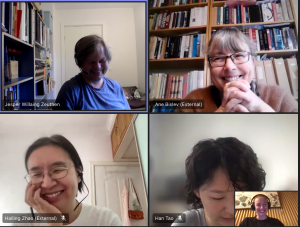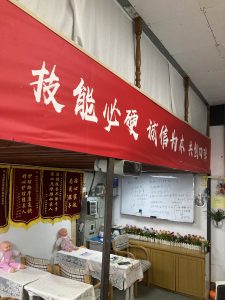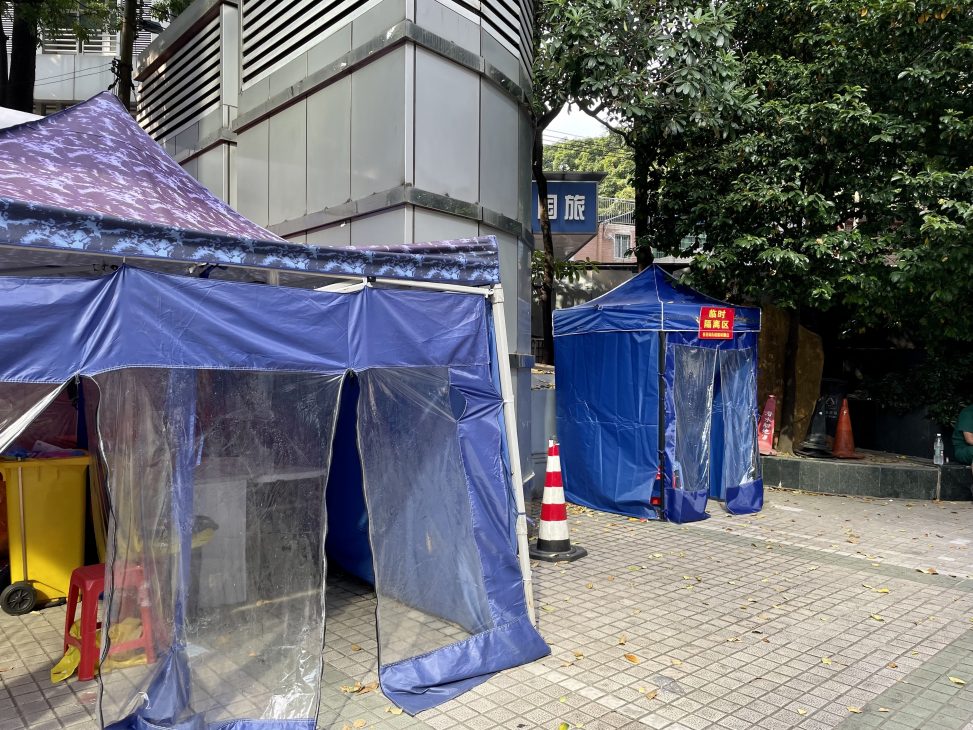In the past year, members of the MDMP project have been able to deepen their understanding of social credit policies through fieldwork, and we have more publications in development and presentations of work in progress than ever before. Given the distributed geography of the project, we have continued to meet online between Aalborg, Copenhagen, Wellington and Shenzhen, depending on where members have been based in any given month. The calendar year of 2023 coincides with the PI, Rachel’s sabbatical, but project meetings have continued every other week as we are all so accustomed to online meetings – even if time-zones have sometimes caused some challenges! COVID-19 continued to have an impact on the MDMP project, with slowed reviewer timeframes and the sudden opening up of China at the end of 2022.

another online project meeting
Fieldwork and Access
In July 2022, Han Tao departed Copenhagen for Shanghai, in the first step of a still highly complex and challenging journey under China’s Zero COVID policy. Like Hailing, who had departed earlier from the UK the same year, she kept detailed fieldnotes of the stages of digital access, from PCR testing to local Health Code approvals and quarantine experiences. This first phase of fieldwork (c. July – December 2022) involved complex processes of navigating travel restrictions and COVID testing. Han has been conducting fieldwork in Changsha and Guangzhou. She talked to senior bankers, credit rating agencies, and microentrepreneurs in both cities, scrutinizing their understanding of social and financial credits. Hailing, being already in the field, has been collecting data on various ways of living with different forms of blacklisting. She has been able to gain access to both data on how local governments work with blacklisting and how individuals with the help of both agencies and local governments may seek to bypass blacklisting.
In July and August of 2023, Jesper conducted brief fieldwork in the Shanghai region (Suzhou and Jiaxing). The purpose was firstly, to gain an initial impression of what had happened to digital governance in China since his last visit prior to Covid 19. The second objective was to collect data to future work. There were a number of access issues throughout the trip. Worries about continued opportunities for the two postdocs to conduct fieldwork meant that he did not conduct fieldwork along with the two postdocs in Guangdong, because we assessed that increased public attention to their fieldwork could harm access opportunities. Jesper conducted fieldwork through partners in Jiaxing and Suzhou. Fieldwork was intended to focus on digital checks of the credibility of domestic workers. However, access was challenging, because the topic was considered sensitive. Instead, Jesper focused on studying how parents with children with ASD spectrum deceases organized digital fora and established institutions for helping their children as well as other parents. Some of these networks are almost exclusively virtual, and are thus examples of new types of mobility.

Domestic Service Agency with integrated teaching and accommodation facilities, Suzhou, August 2023. Image from a private training facility for domestic workers. Digital checks of the credibility of individual domestic workers play an increasing role, however, less so at this particular facility.
Conferences
In the third year of the project, the MDMP project was present at four national and international events, and co-hosted two international events.In September 2022, Rachel joined the Quantified Futures team in Belgium, at an event hosted by Moisés Kopper. She presented “Weaving the Net”, co-authored with Hailing, now published in the East Asian STS Journal, and known within the project as the “data workers paper”. In October, Rachel again shared the paper and its findings with international colleagues at the Danish symposium Ethnographies of Urban Data, this time emphasizing the city building and housing-based dimensions of the work.
In October, Rachel, along with ITU colleague Cancan Wang, co-hosted “Data Logics”, a workshop in Oslo in collaboration with Chunrong Liu at the Oslo Department of Culture and Oriental Languages. Using a hybrid format, the workshop foregrounded the intersection of digital and environmental interventions, and a short collection of conversations is forthcoming, with illustrations from Naho Matsuda.
November saw the American Anthropological Association conference in Seattle, where Rachel participated in a panel organized by Sarah Vaughn and Natalie Vena on “The Unsettling Landscapes of Climate Change Data Practices”, and she also participated as a contributor on Anna Weichselbraun and Nick Seaver’s roundtable ‘Anthropologists as File Managers”, which was very nerdy. In November in Aalborg, Jesper Willaing Zeuthen and co-organizer Xing Li organized a further international conference “Probing China’s Way Forward in an Era of Global Uncertainties and Disorder’ which crossed disciplines and put the project in broader conversations.
We got 2023 off to an amazing start in February, as the project built on networks of our May 2022 launch conference as Jesper Willaing Zeuthen co-hosted with Haiqing Yu an International Conference on Automated Decision Making in Chinese Societies, which brought together project members both in Melbourne in person and online to participate in wide ranging conversations about concrete uses of automation and its impacts. Rachel joined the centre for Automated Decision Making for two weeks following the conference, hosted by Haiqing Yu.
Outreach activities
The project has continued to share expertise across a range of fora: Ane Bislev visited a stats gymnasium in Aarhus, and was interviewed for background research on P3 Essensen, produced by DR, the Danish public broadcast service. The clip can be viewed on the P3 youtube channel here.
Meanwhile, students on the International Relations Program at the Department of Politics and Society at Aalborg University continue to benefit from the project during classes for first semester masters. Students on ITU’s Master in Digital Innovation and Management also got a taste of the project’s findings through the course The Digital State, which was run by Alena Thiel during Rachel’s sabbatical.
Writing and Teaching
The project’s first publication, “Weaving the Net” was published in December 2022, in the East Asian STS journal, co-authored by Hailing Zhou and Rachel DouglasJones. It focuses on ‘data workers’ in Shenzhen, their role in implementing the social credit policy of the management of people through housing in the city, and the longer paths of data they collect towards ‘smart city’ objectives. The second and third papers came out in the summer of 2023. “Finding Good Help” was published in the Journal of Current Chinese Affairs co-authored by Qiuyu Jiang, Jesper Willaing Zeuthen and Ane Bislev. It focuses on the evolution of digital mediation within the market of domestic workers, in particular through the building of the national Domestic Service Credit Check App. “Local Politics in an age of Automated Decision Making in China”, co-authored by Haiqing Yu of RMIT, Australia and Jesper Willaing Zeuthen, project CI, focuses on a scandal around the Henan health code app, in the Journal of Contemporary China. Finally, a collaborative paper written by Han Tao, Hailing Zhou and Rachel Douglas-Jones in the summer of 2022 the process of accessing the field under COVID-19 has been accepted in the journal Commoning Ethnography for its 5th issue in December 2023. In addition, all project members participated in joint pieces for Made in China, primarily in efforts to theorise and describe life under COVID-19 restrictions, in particular the impact for those on the move. Drawing heavily on Hailing and Han’s fieldnotes, these short essays are intended for classroom teaching and broader dissemination of reflections on the impacts of COVID on both fieldwork and everyday life.
Papers based on work done in the first year of the project have continued to be developed: Rachel and Qiuyu submitted an article on blood donation and social credit to the special issue resulting from the Quantified Futures event organized by Moisés Kopper in Brussels, forthcoming in a special issue of The Cambridge Journal of Anthropology which Kopper is editing with Hannah Knox. The article received very constructive feedback and should come out in 2024. An article co-authored with Mace Ojala and Qiuyu Jiang has been challenging to place due to its methodological focus, but will be going under review with the International Journal of Social Research Methodology towards the end of the year.
For all project publications, please see the publications tab.
Despite the disruptions caused by the pandemic, we have sought to continue pursuing our understanding of our first year’s research questions about when and where social credit mechanisms become relevant to people on the move. We are looking forward to seeing what the next year brings!

Leave a Reply